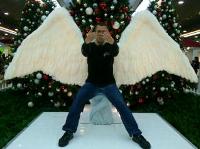it sounds comfortable to most of Japanese though.
| Hot Topics | |
|---|---|
Why do gaijins hate the sound of cicadas?
33 posts
• Page 1 of 2 • 1, 2
Why do gaijins hate the sound of cicadas?
[YT]Ez7bPjSJGc8[/YT]
it sounds comfortable to most of Japanese though.

it sounds comfortable to most of Japanese though.
-

Takechanpoo - Posts: 4294
- Images: 4
- Joined: Fri Oct 06, 2006 10:47 pm
- Location: Tama Prefecture(多摩県)
take, where on earth did you get this idea? i can only speak for myself, but they don't bother me any more than any other sound, and i'm generally quite sensitive to noise.
sounds i do hate:
- loudspeaker cars
- lunchtime air-raid sirens (hint to town office - war ended 60+ years ago)
- heavy construction on four sides of my house
- sparrows
- my mother-in-law chewing her food with her mouth open
- cows
- distorted j-pop on conbini loudspeakers
to name a few.
sounds i do hate:
- loudspeaker cars
- lunchtime air-raid sirens (hint to town office - war ended 60+ years ago)
- heavy construction on four sides of my house
- sparrows
- my mother-in-law chewing her food with her mouth open
- cows
- distorted j-pop on conbini loudspeakers
to name a few.
"Cause I'm stranded all alone, in the gas station of love, and I have to use the self-service pumps.."
- "Weird Al" Yankovic
- "Weird Al" Yankovic
-

james - Posts: 1829
- Images: 1
- Joined: Fri Oct 22, 2004 9:21 am
- Location: off the deep end
I like the sound of semi in the summer. It is very natsukashii
I will not abide ignorant intolerance just for the sake of getting along.
-

American Oyaji - Posts: 6540
- Images: 0
- Joined: Sun Oct 20, 2002 9:20 pm
- Location: The Evidence of Things Unseen
-

Cyka UchuuJin - Posts: 2007
- Joined: Wed Jul 11, 2007 7:39 pm
- Location: Here, there, and everywhere.
-

Takechanpoo - Posts: 4294
- Images: 4
- Joined: Fri Oct 06, 2006 10:47 pm
- Location: Tama Prefecture(多摩県)
Cyka UchuuJin wrote:true sign of a new gaijin...one who asks the estate agent to find them a flat near a park.
arright, very drunk here, but tell me, how does one get so many greenies with just two posts?
"Cause I'm stranded all alone, in the gas station of love, and I have to use the self-service pumps.."
- "Weird Al" Yankovic
- "Weird Al" Yankovic
-

james - Posts: 1829
- Images: 1
- Joined: Fri Oct 22, 2004 9:21 am
- Location: off the deep end
james wrote:arright, very drunk here, but tell me, how does one get so many greenies with just two posts?
You never heard of the FG Greenie Furikomi system? It's not about the number of the posts, it's about the number of bills wire transfered to "someone's" account....
I'm gonna lose greenies for revealing this, aren't I?
Takechanpoo:
;)"Yeah, I've been always awkward toward women and have spent pathetic life so far but I could graduate from being a cherry boy by using geisha's pussy at last! Yeah!! And off course I have an account in Fuckedgaijin.com. Yeah!!!"
-

Iraira - Maezumo
- Posts: 3978
- Joined: Tue Jun 06, 2006 11:22 am
- Location: Sitting across from an obaasan who suffers from gastric reflux.
Ive always enjoyed the sound of cicadas. even in wester pennsylvania we had them.
I will not abide ignorant intolerance just for the sake of getting along.
-

American Oyaji - Posts: 6540
- Images: 0
- Joined: Sun Oct 20, 2002 9:20 pm
- Location: The Evidence of Things Unseen
More on that fibre optic problem:
Asahi: Singing scourge causes communication breakdown
Asahi: Singing scourge causes communication breakdown
Koji Urakawa of NTT West Corp. thought "it must be a joke" when he discovered the cause of a problem with the company's extensive fiber-optic networks. Since 2002, the regional subsidiary of telecommunications giant Nippon Telegraph and Telephone Corp. has received over a thousand reports of summertime interruptions to its fiber-optic communications. In most cases, the damage has been done to the lead-in cables stretching from main lines into homes. The culprit turned out to be the kumazemi (Cryptotympana facialis), a type of large, black cicada commonly found in western Japan. The noisy insect, which apparently mistakes the cables for dead tree branches, pierces the core wire to deposit its eggs, occasionally breaking the wire and often leaving holes that let in water. "At first, after discovering cicadas were the problem, I thought it must be a joke," said Urakawa, an official of the company's network department.
Kumazemi--literally "bear cicada"--is said to be the largest cicada in Japan. It grows up to about 7 centimeters. In Osaka this summer, NTT West workers are engaged in a heated battle with the insect, which emerges there en masse every four years. This year there has been a particularly large explosion in numbers. Kumazemi have also started spreading to colder northern regions of Japan, possibly aided by global warming. Hideharu Numata, professor of animal physiology at Osaka City University, warns that "countermeasures will soon be needed in the Kanto region, too."
So far, cable damage has mostly been reported in western Japan, from Kyushu to the Tokai region. Last year, customers reported about 1,000 cases to NTT West. A further 200 complaints were lodged with K-Opticom Corp., a telecommunication company wholly owned by Kansai Electric Power Co. Similar complaints are coming in this summer. According to Numata, the hard ovipositor of kumazemi, which is about 1 millimeter in diameter and longer than 1 cm, can easily penetrate the polyethylene resin covering the core wire of the fiber-optic cable. The cut may dent or break the wire, and often leaves a hole which allows water to penetrate.
NTT West started to use an improved lead-in cable at the end of August 2006, when the peak time for egg-laying was over. The new cable has resin-made protective shields embedded in the polyethylene cover on both sides of the core wire. Company officials are hoping the new cable will prove effective. Tatsuta Electric Wire & Cable Co., a cable maker in Higashi-Osaka, Osaka Prefecture, observed how kumazemi deposit their eggs by laying cables in trees. When it discovered that the creatures do not lay eggs in living or unseasoned trees, the company this spring started to sell cables made with polyurethane--which has the same feel as the bark on living trees.
-

Mulboyne - Posts: 18608
- Joined: Thu May 06, 2004 1:39 pm
- Location: London
American Oyaji wrote:Ive always enjoyed the sound of cicadas. even in wester pennsylvania we had them.
My uncle lived in WV and my University was around Pittsburgh and I was there during one of the years those 17 year locusts (cicadas) were around and I found them to be much, much worse than the Japanese ones. Not the sound, but the being everywhere in huge bloody swarms and covering you when mow the lawn etc.
The only noise the Japanese cicadas make that bothers me is them smacking into my windows at night. Sounds like a bird sometimes.
-

ttjereth - Maezumo
- Posts: 1862
- Joined: Sat May 14, 2005 1:42 pm
- Location: Tokyo
I've never had a problem with cicadas as I grew up with them too. But how can Take say that Japanese love them? I was at the Earth Celebration concerts during Obon and these were outdoor in a big park. Occassionally a cicada would fall into the crowd and buzz around etc and all the japanese folk around us would try to flick them away or would screach and jump like they are being attacked by a big brown spider or something. It was the foreigners like us who would catch the disorientated little cicada and set it free on a nearby tree.
GomiGirl
The Keitai Goddess!!!
The Keitai Goddess!!!
-

GomiGirl - Posts: 9129
- Joined: Fri Jul 05, 2002 3:56 pm
- Location: Roamin' with my fave 12"!!
ttjereth wrote:My uncle lived in WV and my University was around Pittsburgh and I was there during one of the years those 17 year locusts (cicadas) were around and I found them to be much, much worse than the Japanese ones. Not the sound, but the being everywhere in huge bloody swarms and covering you when mow the lawn etc.
The only noise the Japanese cicadas make that bothers me is them smacking into my windows at night. Sounds like a bird sometimes.
You shouldn't really post this information, as it will hurt Take's feelings badly. He was under impression that the cicada was a unique, made-in-Japan unique cultural artifact which produces a unique noise which can only be appreciated by the uniquely sensitive ear of unique Japanese.
I'm like you except from the mid-west. Same name, 17 year locusts and we used to have to smash them up as squishy as May Flies. Must be our lack of culture and uncouthness.
"There are those that learn by reading. Then a few who learn by observation. The rest have to piss on an electric fence and find out for themselves!"- Will Rogers

-

Greji - Posts: 14357
- Joined: Fri Jun 25, 2004 3:00 pm
- Location: Yoshiwara
Plenty of Cicadas down South where I was born too. I find their sound to be quite soothing.
Faith is believing what you know ain't so. -- Mark Twain
-

Samurai_Jerk - Maezumo
- Posts: 14387
- Joined: Mon Feb 09, 2004 7:11 am
- Location: Tokyo
gboothe wrote:You shouldn't really post this information, as it will hurt Take's feelings badly. He was under impression that the cicada was a unique, made-in-Japan unique cultural artifact which produces a unique noise which can only be appreciated by the uniquely sensitive ear of unique Japanese.
I'm like you except from the mid-west. Same name, 17 year locusts and we used to have to smash them up as squishy as May Flies. Must be our lack of culture and uncouthness.
Oops. Guess I better keep quiet on the 4 seasons thing huh?
When my uncle used to mow the lawn I guess the cicadas were attracted to the sound of the mower or something so by the time he was done he was covered in them. My aunt used to not let him back in the house until she was sure he got rid of all em
-

ttjereth - Maezumo
- Posts: 1862
- Joined: Sat May 14, 2005 1:42 pm
- Location: Tokyo
http://www.indiana.edu/~preserve/research/CicadasPres/slide14.html
Map of 13 and 17 year cicada broods in the US. they pop out in huge numbers as a part of a strategy of predator satiation...So many pop out at one time that any and all predators will eat their fill of them and there will be still plenty survivors left over to breed the next generation.
Map of 13 and 17 year cicada broods in the US. they pop out in huge numbers as a part of a strategy of predator satiation...So many pop out at one time that any and all predators will eat their fill of them and there will be still plenty survivors left over to breed the next generation.
The Enrichment Center reminds you that the weighted companion cube will never threaten to stab you and, in fact, cannot speak.
-

Kuang_Grade - Maezumo
- Posts: 1364
- Joined: Sat Aug 14, 2004 2:19 pm
- Location: The United States of Whatever
I don't hate "normal" cicadas, I quite enjoy their sound. The sound of summer, very pleasant while having lunch in the park.
The "monster" cicadas that are around Osaka this year though are ear-splittingly loud. It can't be explained without experiencing it really, but a few trees full of them redefines the concept of maximum volume.
The "monster" cicadas that are around Osaka this year though are ear-splittingly loud. It can't be explained without experiencing it really, but a few trees full of them redefines the concept of maximum volume.
And you run and you run to catch up with the sun but it's sinking
Racing around to come up behind you again
The sun is the same in a relative way, but you're older
Shorter of breath and one day closer to death
Racing around to come up behind you again
The sun is the same in a relative way, but you're older
Shorter of breath and one day closer to death
-

FG Lurker - Posts: 7855
- Joined: Mon Nov 29, 2004 6:16 pm
- Location: On the run
100% with you there.
Yeah, for some reason Japanese have this idea that foreigners hate the semi. I don't think we do, I quite like them - at normal volume.
Once though, back when I lived next to a park, some mornings it was intolerable - ear-splitting, vomit inducing, brain immobilisingly loud.
Yeah, for some reason Japanese have this idea that foreigners hate the semi. I don't think we do, I quite like them - at normal volume.
Once though, back when I lived next to a park, some mornings it was intolerable - ear-splitting, vomit inducing, brain immobilisingly loud.
Mr Kobayashi: First, I experienced a sort of overpowering feeling whenever I was in the room with foreigners, not to mention a powerful body odor coming from them. I don't know whether it was a sweat from the heat or a cold sweat, but I remember I was sweating whenever they were around.
- Otaru Onsen Oral Testimony
--------------------------
Keep staring, I might do a trick.
--------------------------
Noriko you whore!
- Otaru Onsen Oral Testimony
--------------------------
Keep staring, I might do a trick.
--------------------------
Noriko you whore!
-

amdg - Maezumo
- Posts: 1880
- Joined: Mon Jun 21, 2004 9:09 pm
- Location: Leaving Noriko's bedroom window as Omae enters
ttjereth wrote:Oops. Guess I better keep quiet on the 4 seasons thing huh?
When my uncle used to mow the lawn I guess the cicadas were attracted to the sound of the mower or something so by the time he was done he was covered in them. My aunt used to not let him back in the house until she was sure he got rid of all em
Are you sure that was the real reason she wouldn't let him back in the house?
Takechanpoo:
;)"Yeah, I've been always awkward toward women and have spent pathetic life so far but I could graduate from being a cherry boy by using geisha's pussy at last! Yeah!! And off course I have an account in Fuckedgaijin.com. Yeah!!!"
-

Iraira - Maezumo
- Posts: 3978
- Joined: Tue Jun 06, 2006 11:22 am
- Location: Sitting across from an obaasan who suffers from gastric reflux.
dimwit wrote:Personally, I've never had problems with the noise of cicadas, but in Japan they don't have the decency to go and die in the forest, and you end up with insect innards all over your bicycle.
Personally, I kinda like watching them when they are in their throughs of death. Bouncing repeatedly into windows, trying to figure out why they don't quite have the mobility they had only a few days earlier. If only J-salarimen would do the same thing, it would make for some great video.
Takechanpoo:
;)"Yeah, I've been always awkward toward women and have spent pathetic life so far but I could graduate from being a cherry boy by using geisha's pussy at last! Yeah!! And off course I have an account in Fuckedgaijin.com. Yeah!!!"
-

Iraira - Maezumo
- Posts: 3978
- Joined: Tue Jun 06, 2006 11:22 am
- Location: Sitting across from an obaasan who suffers from gastric reflux.
I like cicadas as it means its summer. im one of the freaks who actually likes summer in Tokyo. I think its because I have been deprived of sun for much of my life. (Im from London) I only hate cicadas when they start dieing. They are very ugly and kids like to run up to you holding them.
To ponder and wonder
About what lies yonder
To think of times so much fonder
About what lies yonder
To think of times so much fonder
-

akatsuka - Maezumo
- Posts: 222
- Joined: Sun Feb 19, 2006 5:17 am
- Location: Rondon
-

Cyka UchuuJin - Posts: 2007
- Joined: Wed Jul 11, 2007 7:39 pm
- Location: Here, there, and everywhere.
They must be crying too, because IT'S TOO FUCKING HOT OUT HERE! 
[font="Verdana"][SIZE="1"]"This isn't about freedom; this is a slaughter. If I'm gonna get my balls blown off for a word, my word is POONTANG."
Animal Mother, Full Metal Jacket[/SIZE][/font]
Animal Mother, Full Metal Jacket[/SIZE][/font]
-

halfnip - Posts: 426
- Joined: Mon May 28, 2007 10:01 am
- Location: Silicon Valley, CA
halfnip wrote:They must be crying too, because IT'S TOO FUCKING HOT OUT HERE!
if you're in the kanto minato-ku, i send my sympathies. i was in tokyo for exactly 35 minutes en route to naeba a couple weeks ago and christ almighty was it misery. i thought the osaka concrete was hot, but tokyo is a bleedin hell of heat.
-

Cyka UchuuJin - Posts: 2007
- Joined: Wed Jul 11, 2007 7:39 pm
- Location: Here, there, and everywhere.
I never really liked the day time ones, but for some reason at night they had a different song that I found very soothing, and always quickly fell asleep.
The law: Everything existing on the physical plane is an exteriorization of a thought, which must be balanced through the one who issued the thought. (Percival)
-

Maths Dude - Maezumo
- Posts: 366
- Joined: Thu Oct 14, 2004 7:54 am
- Location: World of Permanence
I like cicadas. Make me think of summer beer snacks...



•I prefer liberty with danger to peace with slavery.•
-

Mike Oxlong - Posts: 6818
- Joined: Wed Oct 20, 2004 5:47 pm
- Location: 古き良き日本
Maths Dude wrote:I never really liked the day time ones, but for some reason at night they had a different song that I found very soothing, and always quickly fell asleep.
Dude, you must be on crack! How can you sleep to that god awful sound? If you are making comparison of the cicada noise with a song, then you have got to be referring to be one of the shitty Backstreet Boys songs.
Nah, I'm just joking. I like the sound of cicadas too. ]http://upload.wikimedia.org/wikipedia/commons/thumb/b/ba/Japanese_cicade_semi.jpg/250px-Japanese_cicade_semi.jpg[/IMG]
These suckers are loud.
-

IkemenTommy - Posts: 5425
- Joined: Sun Jul 24, 2005 3:29 am
Cicadas never bothered me. I lived up in Aomori and I guess there was enough greenery that they stayed in the forests and didnt need to come into town so their sounds were always in the distance.
I will not abide ignorant intolerance just for the sake of getting along.
-

American Oyaji - Posts: 6540
- Images: 0
- Joined: Sun Oct 20, 2002 9:20 pm
- Location: The Evidence of Things Unseen
33 posts
• Page 1 of 2 • 1, 2
Who is online
Users browsing this forum: No registered users and 3 guests

